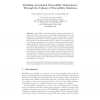Free Online Productivity Tools
i2Speak
i2Symbol
i2OCR
iTex2Img
iWeb2Print
iWeb2Shot
i2Type
iPdf2Split
iPdf2Merge
i2Bopomofo
i2Arabic
i2Style
i2Image
i2PDF
iLatex2Rtf
Sci2ools
106
click to vote
ECMDAFA
2009
Springer
2009
Springer
Enabling Automated Traceability Maintenance through the Upkeep of Traceability Relations
Abstract. Traceability is demanded within mature development processes and offers a wide range of advantages. Nevertheless, there are deterrents to establishing traceability: it can be painstaking to achieve initially and then subject to almost instantaneous decay. To be effective, this is clearly an investment that should be retained. We therefore focus on reducing the manual effort incurred in performing traceability maintenance tasks. We propose an approach to recognize those changes to structural UML models that impact existing traceability relations and, based upon this knowledge, we provide a mix of automated and semiautomated strategies to update these relations. This paper provides technical details on the update process; it builds upon a previous publication that details how triggers for these updates can be recognized in an automated manner. The overall approach is supported by a prototype tool and empirical results on the effectiveness of tool-supported traceability main...
ECMDAFA 2009 | Hardware | Traceability Maintenance | Traceability Maintenance Tasks | Traceability Relations |
| Added | 04 Sep 2010 |
| Updated | 04 Sep 2010 |
| Type | Conference |
| Year | 2009 |
| Where | ECMDAFA |
| Authors | Patrick Mäder, Orlena Gotel, Ilka Philippow |
Comments (0)

